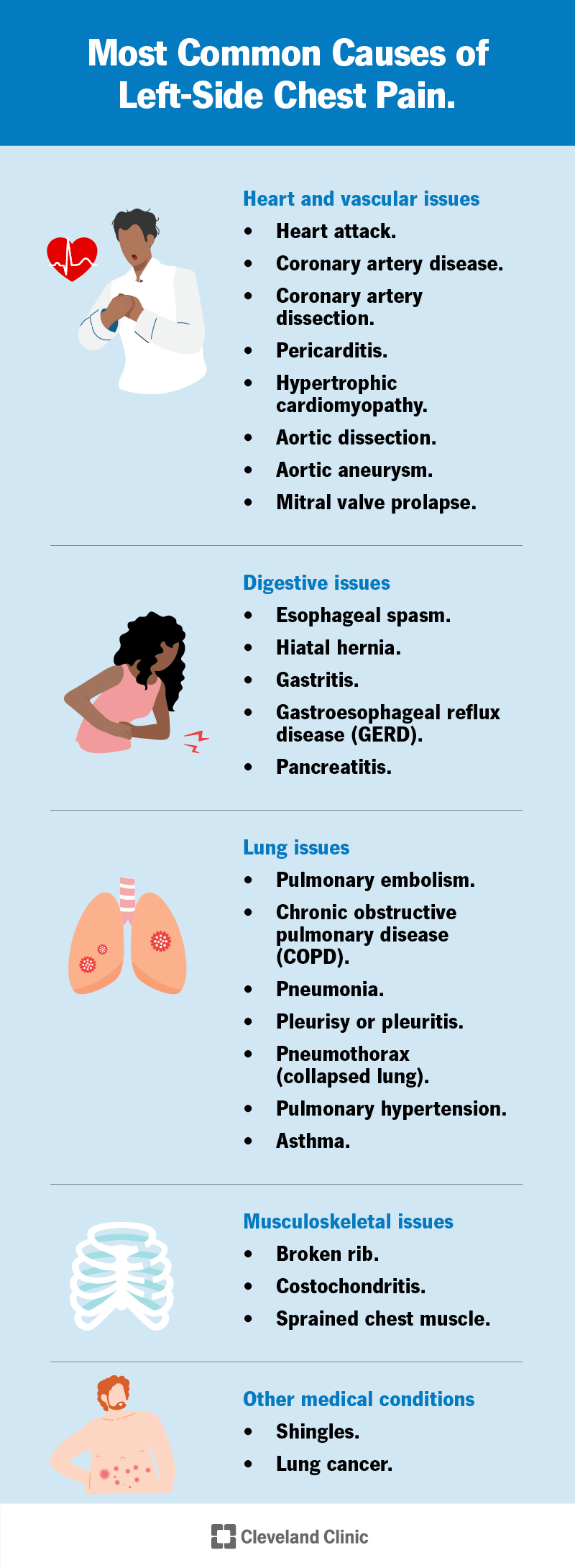Left-side chest pain has many causes. You may think of a heart attack first, but issues with your lungs or digestive system can cause left-side chest pain, too. You need medicine for many sources of left-side chest pain. For others, you may need an operation. A healthcare provider can tell you what’s wrong and put your mind at ease.
Advertisement
Cleveland Clinic is a non-profit academic medical center. Advertising on our site helps support our mission. We do not endorse non-Cleveland Clinic products or services. Policy
Left-side chest pain can be a symptom of an issue with your lungs, heart, muscles and bones, or digestive system. Left-side chest pain from heart-related issues can be strong or sharp. It can feel like pressure. You can also have nausea, but that can go along with digestive issues that also cause chest pain. And there are lung issues that cause pain in your chest and difficulty breathing. You can also have chest pain due to injury or soreness of your muscles and bones.
Advertisement
Cleveland Clinic is a non-profit academic medical center. Advertising on our site helps support our mission. We do not endorse non-Cleveland Clinic products or services. Policy
A healthcare provider can help you sort it all out.
Yes, left-side chest pain is one of the symptoms of a heart attack. But there are others, like shortness of breath or pain in other parts of your upper body.
If you think you’re having a heart attack, call your local emergency number.

Image content: This image is available to view online.
View image online (https://my.clevelandclinic.org/-/scassets/images/org/health/articles/25119-left-side-chest-pain-cv)
Pain on the left side of your chest can come from issues with your heart, blood vessels, lungs, digestive system or other areas.
Issues with your heart or blood vessels often involve problems with getting blood where it needs to go. Blockages in blood vessels or weaknesses in their walls are just some of the reasons for chest pain on your left side.
Advertisement
Some medical conditions in your digestive system can cause left-side chest pain, like:
Medical conditions in your lungs can cause left-side chest pain. Some of these issues need quick treatment, especially if you need help breathing.
You still need medical attention for these issues that don’t involve major organs:
A prompt diagnosis and treatment are best for:
Healthcare providers tailor treatment for left-side chest pain to its cause. Heart issues — and even some lung issues — need emergency care. Anything that keeps blood and/or oxygen from getting to your organs and tissues can be life-threatening.
You may need medicine for conditions like:
Advertisement
You might need to have a procedure or operation for:
For lung cancer, treatment could include surgery, radiation and/or chemotherapy.
Contact a healthcare provider about pain in the left side of your chest. If you think you’re having a heart attack, call your local emergency number.
You can’t treat most causes of left-side chest pain at home. Over-the-counter medicines can help with digestive issues, but if you aren’t sure you’re having a digestive issue, those medicines may not help.
Skipping treatment for left-side chest pain can put your life at risk. Any condition that keeps you from getting enough oxygen to your cells can be life-limiting. This can include lung issues like COPD or asthma, as well as heart conditions.
Advertisement
An aortic aneurysm can be fatal if it bursts and you don’t get help right away. Untreated gastritis can lead to sepsis or stomach cancer in some cases. Lung cancer is fatal for people who don’t get treatment.
Yes, you can prevent some causes of left-side chest pain. You can prevent some heart issues with healthy habits, like:
Other things you can do to prevent causes of left-side chest pain are:
Call your local emergency number if you have left-side chest pain for more than five minutes and it doesn’t improve with rest or medicine.
Advertisement
Left-side chest pain could mean you’re having a heart attack. You may also have other signs, like:
If you have left-side chest pain that comes and goes, contact your healthcare provider as soon as you can determine the cause.
You should seek emergency treatment if you’re having difficulty breathing.
Your mind can go to the worst-case scenario when you have left-side chest pain. But many causes of pain on the left side of your chest have nothing to do with your heart. Still, whatever’s causing your pain will most likely need medical attention. You can give yourself some peace of mind by seeing a healthcare provider. And if you think you’re having a heart attack, call your local emergency number.

Sign up for our Health Essentials emails for expert guidance on nutrition, fitness, sleep, skin care and more.
Learn more about the Health Library and our editorial process.
Cleveland Clinic’s health articles are based on evidence-backed information and review by medical professionals to ensure accuracy, reliability and up-to-date clinical standards.
Cleveland Clinic’s health articles are based on evidence-backed information and review by medical professionals to ensure accuracy, reliability and up-to-date clinical standards.
Whether you need stitches, a broken bone set or think your appendix might be causing your abdominal pain, Cleveland Clinic’s emergency medicine team is here to help.
